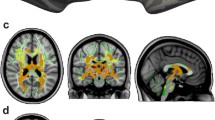Abstract
Wolfram syndrome, characterised by diabetes insipidus, diabetes mellitus, optic atrophy sensorineural deafness and acquired urinary tract abnormalities, is an hereditary neurodegenerative syndrome, the pathogenesis of which is unknown. We report the post-mortem findings on a patient with well-documented Wolfram syndrome. The brain showed severe degeneration of the optic nerves, chiasm and tracts as well as severe loss of neurons from the lateral geniculate nuclei, basis pontis, and the hypothalamic paraventricular and supraoptic nuclei. In addition, there was a widespread axonal dystrophy with axonal swellings in the pontocerebellar tracts, the optic radiations, the hippocampal fornices and the deep cerebral white matter. This widespread axonal pathology parallels the pattern of neurodegeneration and in many areas is more striking than neuronal loss.
Similar content being viewed by others
Author information
Authors and Affiliations
Additional information
Received: 18 November 1998 / Revised, accepted: 3 February 1999
Rights and permissions
About this article
Cite this article
Shannon, P., Becker, L. & Deck, J. Evidence of widespread axonal pathology in Wolfram syndrome. Acta Neuropathol 98, 304–308 (1999). https://doi.org/10.1007/s004010051084
Issue Date:
DOI: https://doi.org/10.1007/s004010051084




